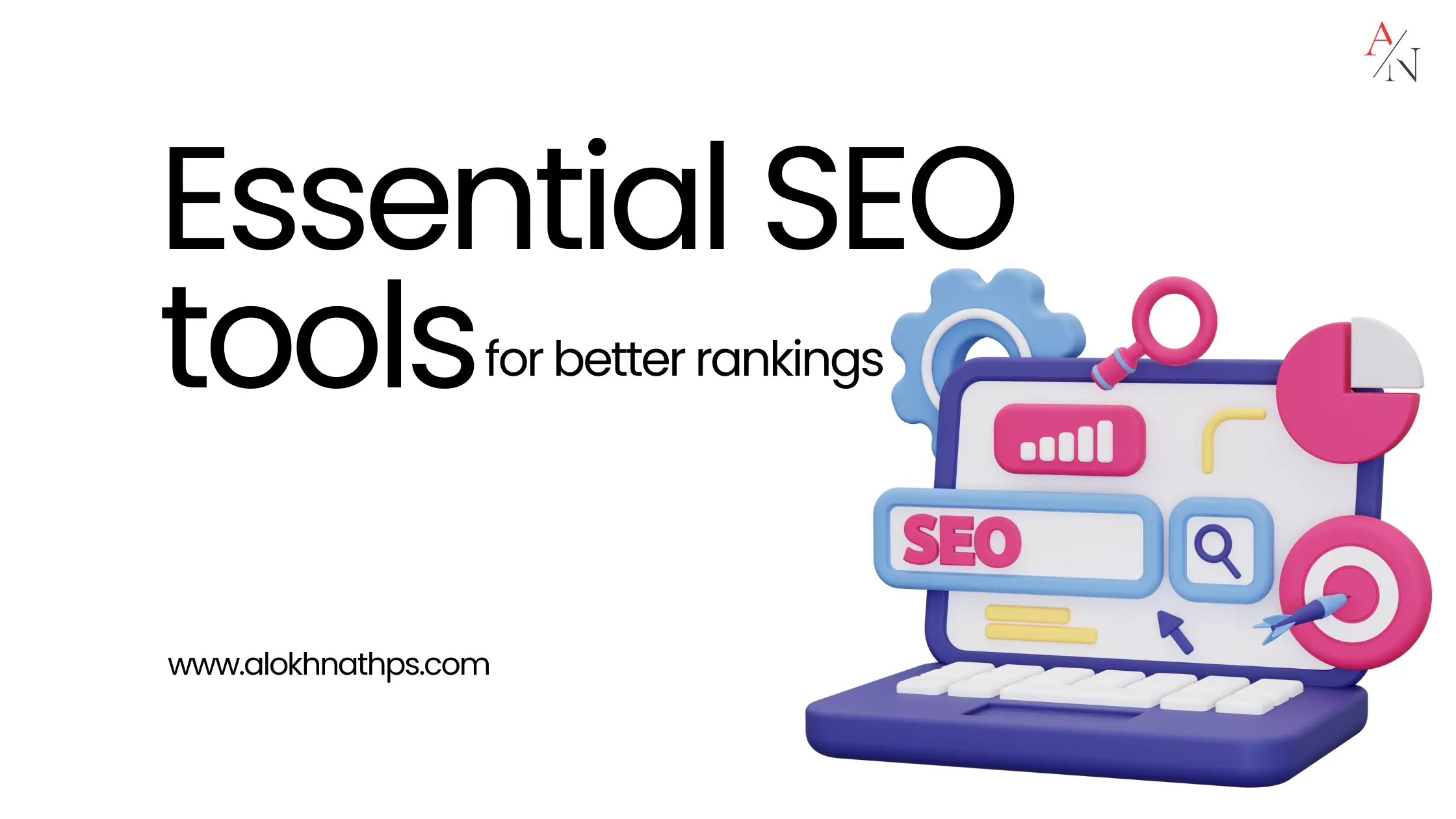Published
April 05, 2025
Comprehensive List of SEO Tools
In the world of digital marketing, having the right tools at your disposal can make all the difference. In this article categorized list of essential and specialized SEO tools for various aspects of search engine optimization that can help you optimize your website.
1. Keyword Research Tools
- Google Keyword Planner (Free):
- Integrated with Google Ads, provides keyword ideas, search volume, and competition data.
- Best for understanding Google's search data and planning ad campaigns.
- Ahrefs Keywords Explorer (Paid):
- Comprehensive keyword research tool with extensive data, including keyword difficulty, click metrics, and SERP overviews.
- Excellent for competitor keyword analysis and identifying content gaps.
- SEMrush Keyword Magic Tool (Paid):
- Offers a vast database of keywords, including long-tail variations and related terms.
- Provides advanced filtering options and keyword grouping features.
- Moz Keyword Explorer (Paid):
- Provides keyword suggestions, difficulty scores, organic CTR data, and SERP analysis.
- Keyword priority feature is very useful.
- Ubersuggest (Freemium):
- Offers keyword ideas, search volume, and competitor analysis, with a user-friendly interface.
- A good option for beginners and budget-conscious users.
- Keywordtool.io (Freemium):
- Generates long-tail keyword suggestions from various search engines, including Google, YouTube, Bing, Amazon, and more.
- AnswerThePublic (Freemium):
- Visualizes search queries and questions related to a keyword, providing insights into user intent.
2. Site Audit and Technical SEO Tools
- Google Search Console (Free):
- Essential tool for monitoring website performance in Google search, including crawl errors, indexing issues, and search queries.
- Provides insights into mobile usability, security issues, and Core Web Vitals.
- Screaming Frog SEO Spider (Freemium):
- Crawls websites and identifies technical SEO issues, such as broken links, duplicate content, missing meta tags, and schema markup errors.
- A powerful tool for in-depth site audits and technical SEO analysis.
- Lighthouse (Free, integrated with Chrome DevTools):
- Audits website performance, accessibility, SEO, and best practices.
- Provides actionable recommendations for improving page speed and user experience.
- SEOptimer (Freemium):
- Provides quick site audit reports with actionable recommendations.
- GTmetrix (Freemium):
- Analyzes website speed and performance, providing detailed insights into page load times and optimization opportunities.
- Google's PageSpeed Insights (Free):
- Google's tool for analyzing page speed, giving both mobile and desktop scores.
- HTTP Status Code Checker (Free online tools):
- Tools that check the status codes of URLs, to help identify broken links and redirects.
- Robots.txt Tester (Google Search Console):
- Checks the syntax of your robots.txt file, and verifies if specific URLs are blocked. If you want to generate new robots.txt file for your website checkout the robots.txt generator
3. On-Page SEO Tools
- Yoast SEO (Freemium, WordPress plugin):
- Helps optimize content for search engines, including title tags, meta descriptions, and keyword usage.
- Provides readability analysis and schema markup integration.
- Rank Math (Freemium, WordPress plugin):
- Offers advanced SEO features like schema markup, keyword tracking, and internal linking suggestions.
- Includes detailed content analysis and automation options.
- Surfer SEO (Paid):
- Analyzes top-ranking pages and offers content optimization based on keyword usage, related terms, and structure.
- Improves content relevance and increases ranking potential.
- Clearscope (Paid):
- AI-powered tool offering content grading and keyword suggestions for SEO-friendly writing.
- Supports better content performance in search engines.
- Grammarly (Freemium):
- Enhances writing clarity and grammar, indirectly benefiting SEO by improving readability and engagement.
- Helps ensure professional, error-free content.
4. Backlink Analysis Tools
- Ahrefs Site Explorer (Paid):
- Provides detailed backlink data, including referring domains, anchor text, and link growth.
- A comprehensive tool for competitor backlink analysis and identifying link building opportunities.
- SEMrush Backlink Analytics (Paid):
- Offers backlink analysis, competitor research, and link building outreach features.
- Moz Link Explorer (Paid):
- Provides backlink data, domain authority metrics, and spam score analysis.
- Google Search Console (Free):
- Provides a simple list of backlinks that Google has found, along with referring domains.
5. Rank Tracking Tools
- SEMrush Position Tracking (Paid):
- Monitors website rankings for target keywords across various search engines and locations.
- Provides daily updates and competitor tracking.
- Ahrefs Rank Tracker (Paid):
- Tracks keyword rankings and provides insights into ranking fluctuations.
- Monitors SERP features and overall keyword performance.
- Moz Rank Tracker (Paid):
- Monitors keyword rankings and visibility metrics.
- Tracks competitors and compares performance over time.
- Google Search Console (Free):
- Tracks the average position of your web pages in Google Search results.
- Provides insights into search queries and impressions.
- AccuRanker (Paid):
- A specialized rank tracking tool known for its high accuracy and speed.
- Offers frequent updates, competitor comparison, and SERP tracking.
6. Local SEO Tools
- Google Business Profile (Free):
- Essential for managing your business's online presence in Google Search and Maps.
- Allows updates to business information, responds to reviews, and uploads photos.
- BrightLocal (Paid):
- Provides tools for managing citations, monitoring reviews, and tracking local rankings.
- Offers local SEO audits, reputation management, and customizable reporting.
- Yext (Paid):
- Manages business listings across multiple platforms to ensure accuracy and consistency.
- Helps improve visibility in local search and voice search results.
- Whitespark (Paid):
- Specializes in building local citations and tracking local search rankings.
- Offers tools for review generation and local SEO audits.
7. Analytics Tools
- Google Analytics (Free):
- Provides detailed website traffic and user behavior data, including page views, bounce rate, and conversion tracking.
- Essential for understanding website performance and user engagement.
- Google Data Studio (Free):
- Connects to various data sources, including Google Analytics and Google Ads.
- Creates customizable, shareable reports and interactive dashboards.
8. Schema Markup Tools
- Google Rich Results Test (Free):
- Tests structured data on your web pages and previews eligible rich results.
- Replaces the deprecated Structured Data Testing Tool for most use cases.
- Schema Markup Generator (Various free tools):
- Generates schema markup code for different content types (articles, products, FAQs, etc.).
- Helps easily create valid JSON-LD structured data for websites.
- Google Structured Data Testing Tool (Deprecated):
- Previously used for checking schema markup validity but now deprecated in favor of Rich Results Test.
9. Content Optimization Tools
- Hemingway Editor (Freemium):
- Helps improve writing readability and clarity by highlighting complex sentences and passive voice.
- Provides a readability score to guide content simplification and effectiveness.
Important Notes
- Freemium vs. Paid: Many tools offer both free and paid versions. Choose the option that best suits your needs and budget.
- Tool Selection: The best tools for you will depend on your specific SEO goals and requirements.
- Continuous Learning: SEO is constantly evolving, so it's important to stay up-to-date with the latest tools and techniques.

